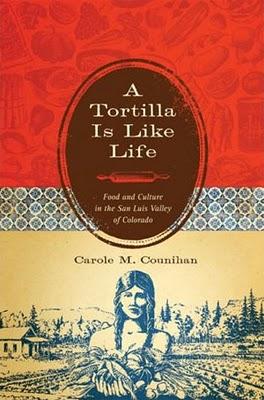A Tortilla Is Like Life: Food and Culture in the San Luis Valley of Colorado

From the time Laura Esquivel’s well known novel Like Water for Chocolate was made into a film, food and meals have been presented as a means of communication that extends beyond the dinner table. A Tortilla Is Like Life is an excellent book about Hispanic food, recipes, and home remedies.
A Tortilla Is Like Life is an introduction to the unique Hispanic community of Antonito in San Luis Valley of Colorado. This small urban centre with a population of approximately 900 has Spanish, Mexican, and American Indian ancestry with some Anglophone influences. The town of Alamola, thirty miles away with a population ten times the size of Antonito, provides employment for people from nearby communities.
Carole Counihan, an anthropologist who settled in Antonito with her husband and two sons, presents the culture of the community by gathering food-centred interviews between 1996 and 2006 from nineteen women ages thirty-two to ninety-four, making fifty-five interviews in total. Two women in particular play a major role by providing information about the food, traditions, and culture of Antonito. The most active participants in Counihan’s study were Helen Ruybal, born in 1906, who she interviewed nineteen times, and Teddy Madrid, born in 1936, who was interviewed six times.
In this small community, gender arrangements surrounding cooking have changed over the years along with the archetype of the Chicano patriarchal family. Food sits at the heart of the household, contributing to the structure of families. A woman who prepares food is seen as the head of the family, and women construct relationships with men through cooking. Given that many women sell prepared food to make a living, domestic duties belong to both husband and wife. Through food, women establish a sense of their own identity, culture, and place in society. They create stories about food to preserve their legacy for future generations.
Certain foods encapsulate memories, rituals, beliefs, and traditions. Two things that are central to the Antonito diet (for both flavour and tradition) are red and green chilis, which are eaten on numerous occasions—with extended families, during birth rituals, at one's wedding, and after death—as they communicate love, nurturing, and care.
Counihan wants to enrich the understanding of Antonito’s history by presenting diverse women’s voices and creating a cultural mosaic revealing how they relate to food and community. She classifies her book as testimonio and has done a very thorough job researching. A Tortilla Is Like Life deals very well with the sense of cultural belonging felt by those living in a community where women’s identity is shaped by food.